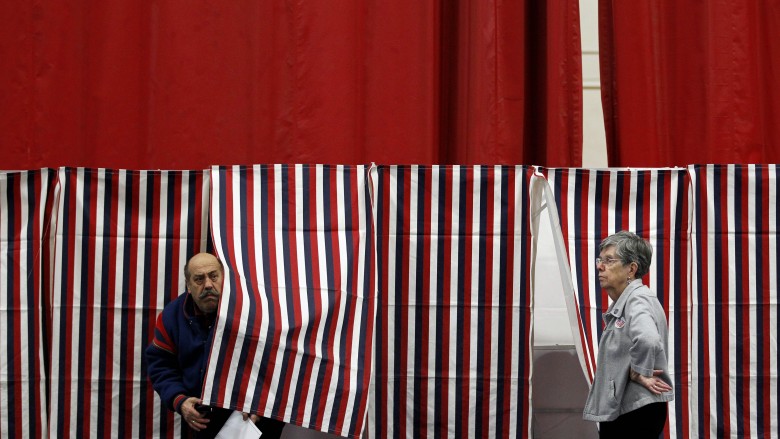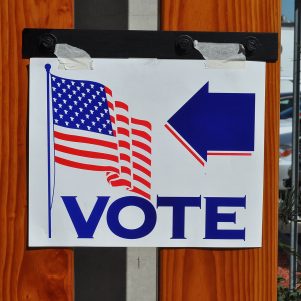Menagerie of Mass. ballot questions seen as sign of civic health
By Stephen Beale | July 27, 2016, 6:34 EDT
 (AP file photo/Matt Rourke)
(AP file photo/Matt Rourke) As many as six citizen petitions could end up as questions on the ballot this November, covering everything from cruelty to farm animals to marijuana legalization to a special tax on millionaires. In all, as many as 35 petitions were filed — though only a handful made it through the certification process.
Direct democracy is alive and well, so it seems. But is that a good thing?
It depends on the issue and who’s advocating for it, political scientists say.
“I don’t think there is a simple answer to the question of whether ballot initiatives are good or bad for democracy,” said Dr. Archon Fung, the academic dean at Harvard’s Kennedy School of Government.
“The best issues to be addressed are those where there is a clear policy decision to be made. Raising taxes is a clear-cut decision, as is expanding charter schools, having more gaming, and raising taxes on millionaires,” said Dr. Darrell West, vice president and director of Governance Studies at the Brookings Institution, naming some of the issues headed for the Massachusetts ballot. “Things that are more complex or technical are not good to decide through referenda because it is hard to interpret voter preferences on complex issues and difficult for voters to express a clear preference.”
For the framers of the U.S. Constitution, the answer would have been a resounding no, according to Dr. James Morone, a Brown University political scientist who specializes in the study of American democracy.
“They would have hated it,” Morone said.
But the system of government the Framers set up did not eliminate direct democracy. Instead, direct democracy — a term today used to describe civic involvement, ranging from local school board elections to recalls of governors — survived within that system as a built-in tension, Morone added.
“It’s in the DNA of American government,” Morone said.
In fact, direct citizen involvement predates the adoption of the U.S. Constitution, going back to the early years of the American Revolution in the late 1770s and into the 1780s, when Massachusetts delegates to the state assembly were elected annually. And, even then, issues such as a proposed tax were not decided by the delegates alone. Instead, state lawmakers adjourned to return to their districts to canvass their constituents’ positions on such matters.
The framers of the U.S. Constitution set up a more representative system of government that would ‘filter’ out and ‘cool’ popular passions, according to Morone, quoting some of the terms employed by the Framers.
Even so, it left the door wide open to direct democracy by leaving many key questions about how to hold elections up to the states, Morone noted. “It leaves a lot of blanks,” Morone said. “What we’re doing is still filling in the blanks.”
Direct democracy via statewide ballot questions was pushed by progressives in the late nineteenth century and flourished mostly in the Western states near the turn of the century where women were first allowed to vote, according to Morone. One of the earliest instances was in Oregon, where voters were asked whether the new state constitution should allow slavery. A majority said no. But voters were also queried on whether black citizens should be allowed into the new state. That received an even stronger negative vote. (The new state constitution was approved in 1857. Oregon was granted statehood in 1859.)
The vote illustrates one of the persistent pitfalls of ballot questions: the way in which they can be used to discriminate against certain groups based upon race or gender, according to Morone.
But when ballot questions challenge the political establishment, Morone sees a positive. “They work best for things that are just off the political agenda,” Morone said. “So they’re a way for the citizenry to get new ideas, fresh ideas into play.”
He points to state ballot questions on marijuana — first medical marijuana, and now, more commonly, legalization of recreational marijuana — as a great example. While the political establishment wanted nothing to do with the issue, a number of energized younger voters — mostly the under-35 set — have turned to ballot questions to force marijuana onto the legislative agenda across the country.
Ballot questions may be a good way of injecting fresh ideas into the political discourse. But when it comes to hashing out the details, it is better to defer to representative democracy, Morone said. In the case of marijuana legalization, up or down votes are well suited for the ballot. Questions about how to reform driving-under-the influence laws or how much potency to permit are best addressed by lawmakers, he added.
Fung agrees that ballot questions can be “a useful corrective to failures of the representational political system.” He sees a potential downside over the potential influence of big money. “Sometimes, when well-funded organizations line up on one side of a ballot question, a small group of interests can drive the process and be quite bad for democracy,” Fung said.
One such case was a ballot question on GMO labeling in Washington state, where money from industry sources was “very lopsided,” according to Fung. “That experience illustrates the dangers to democracy that uneven financing poses. This threat is an enormous problem for elections — representative democracy — and it can be a large threat to initiatives and referenda as well,” he said.
Industry sources pumped $22 million into defeating the question, nearly four times the amount spent by its supporters, who wanted food labels to note whether the products are made with Genetically Modified Organisms (GMOs), according to a November 2013 report in Reuters. The measure went down in defeat with 54.8 percent against it and 45.2 percent voting in support of it.
West said the role of money is “the biggest controversy” about referenda today. And it’s not big business alone that may have an outsized influence. “Some worry that referenda get skewed by rich people or special interests when money comes in disproportionately on one side of an issue,” West said.
Fung stresses the need for educating voters. He noted that there is currently an effort to create a Citizens Initiative Review for Massachusetts modeled on a similar panel in Oregon. The panel would provide guidelines on the pros and cons of the various ballot questions, according to Fung, who is involved in the effort as a member of its advisory board.
“I think it’s an excellent idea because it would help voters to better understand the ballot measures that they are being asked to consider,” Fung said.
NBPDemocracy










